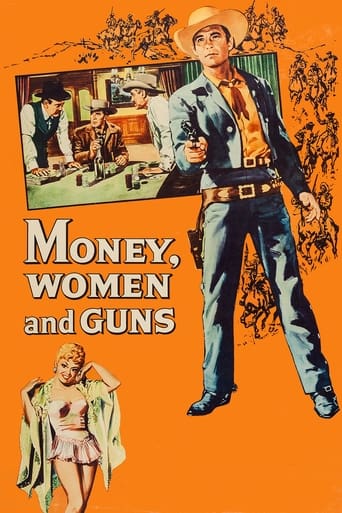LouAbbott
A better than average western programmer with an excellent cast of character actor veterans, including Kim Hunter, Lon Chaney, William Campbell, James Gleason, Phillip Terry, and Don Megowan. Jock Mahoney gives a very natural performance as the lead character. The story and dialogue are also a step above for this type of film, as is the direction. If you think you have the plot figured out after the first 10 minutes of the film, well, keep watching. If you enjoy this type of B-movie western, with more brains than bullets, you'll have fun!
classicsoncall
The first thing one has to do is overlook the title of this story - there was money involved of course, but just one woman of note, and guns didn't come into play all that much. It appears most of the other reviewers before me gave this picture short shrift, but with a deviation from the standard formula, I thought the story line provided some clever elements to Silver Ward Hogan's (Jock Mahoney) search for a dead prospector's beneficiaries and the man who murdered him.As for that dead prospector, Ben Merriweather (Edwin Jerome), if you keep an eye on him as he scrawls out his dying note, there's no way his erratic, shaking hand could have produced anything legible. But it's that note that provides the premise of the story, as Merriweather's fortune of three hundred thousand dollars is to be split between five intended heirs and the man who locates them, as long as the killer is identified in the process.Where the story gets interesting is how the identities of the named persons play out. One of them is just a young boy, another spent some jail time with the old codger earlier in their lives. The revelations are more than a surprise for detective Hogan, who turns up pieces of a puzzle that don't seem to fit until he identifies the last of his quarry. The Johnny Bee gimmick was a pretty good one in the final resolution, though I don't think I would have been quite so understanding as Hogan if Bee/Briggs took a couple of shots at me.Through it all, Ward Hogan comes to terms with his wanderlust, finding romance with the mother (Kim Hunter) of young Davey Kingman. Set around Christmas time, the story allows for some mention of a benevolent Santa Claus looking out for Davey, who in the final analysis is rewarded for his wishful thinking - "You gotta wish special hard, but it works".But you know what the topper was? What's Judas going to do with fifty thousand dollars?
kevin olzak
1958's "Money, Women and Guns" was a somewhat modest color B-Western from Universal, where Jock Mahoney was coming off his one science fiction title, "The Land Unknown." Elderly prospector Ben Merriweather (Edwin Jerome) is bushwhacked by a trio of masked marauders, two of which are killed in a brief shootout. In his final moments, the dying man writes out his last will and testament, leaving his wealth to a half dozen beneficiaries, and it's up to Mahoney's frontier detective 'Silver' Ward Hogan to track each one down. One is played by William Campbell, an ex-con struggling to go straight alongside young wife Judi Meredith (both worked for Roger Corman in 1966, Campbell in "Track of the Vampire" and Meredith in "Planet of Blood"). The youngest is David Kingman (Tim Hovey), a little boy whose only contact with Merriweather was a conversation about Santa Claus; his widowed mother (Kim Hunter) takes a shine to the wandering loner that David worships. One self contained vignette teams James Gleason's Henry Devers with Lon Chaney's Art Birdwell; Devers was Merriweather's former prospecting partner, who sends his poker playing partner Birdwell into town to cash his $50,000 beneficiary check. Jeffrey Stone followed up with "The Thing That Couldn't Die," while Phillip Terry did "The Leech Woman" (Tom Drake worked with Chaney in 1956's "The Cyclops" and 1966's "House of the Black Death"). As for Chaney, this innocuous little Western marked his final credit for Universal, the studio that cast him adrift following 1945's "House of Dracula," calling him back on only four occasions, the first three being 1948's "Abbott and Costello Meet Frankenstein," 1951's "Flame of Araby," and 1952's "The Black Castle" (he previously worked for director Richard H. Bartlett in 1955's "The Silver Star," for Lippert Pictures).
dougdoepke
The title itself just about sums up Hollywood film production. Kidding aside, this Western's got a number of nice touches, and with a more involved director (Bartlett) and dynamic lead (Mahoney), could have gelled into a genuine sleeper. It's got an unusual mystery premise for a Western— detective Hogan has to figure out which beneficiary killed the wealthy old miner— as well as a cast of former A-players— Chaney, Drake, Evans, Gleason, and Terry. But especially, there's Kim Hunter who only a few years earlier picked up a heavyweight Oscar for A Streetcar Named Desire (1951).I suspect it's a better than the average B-production because of studio (Universal) backing. That backing leads to some scenic locations, fine color photography, and the supporting cast of familiar faces. Also, the unconventional script contains some nice ironies, along with a few surprises. In fact, calling this a pacifist Western may not be too much of a stretch.Mahoney certainly looks the part of a Western hero, but unfortunately more or less walks through his part in a perfectly tailored outfit. Then too, director Bartlett does nothing to draw us further into the story-- as a result, we remain on the outside, looking in. Anyway, it remains a Western of fine visuals with an unusual storyline, despite the two central drawbacks.


